Articles
11.12.2023
Final conference of the 6th medium-term programme 2020-2023 (13-14 December 2023, Graz, Austria & online)
“Inspiring innovation in language education: changing contexts, evolving competences” – Join the livestream!
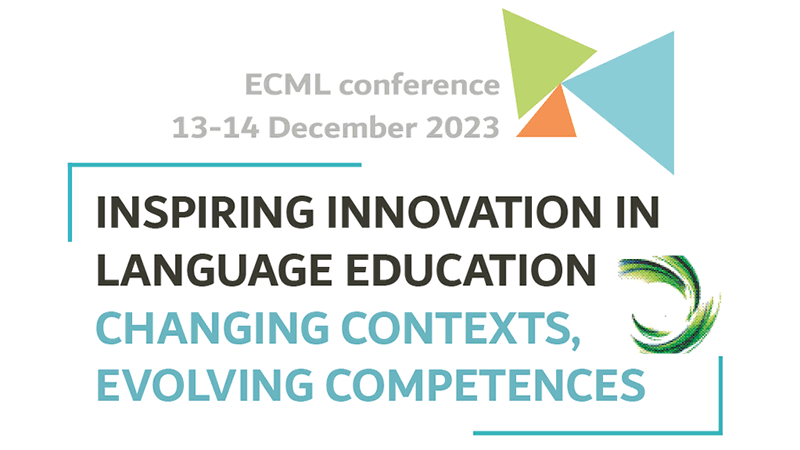
The conference represents the culmination of the four years of work of the ECML’s “Inspiring innovation in language education: changing contexts, evolving competences” programme, involving, among others, 9projects, 1think tank, 12offers of training and consultancy (TaC) and a series of initiatives developed with the support of the European Commission.
The conference is aimed at all language education professionals and in particular at ECML stakeholders, policy makers and persons with a professional focus on the practice of language education (curriculum development, teacher education, material design…).
The programme involves plenary presentations, speeches, a round table, a series of smaller workshops for the presentation and discussion of programme outputs and outcomes as well as envisaged links to activities in the 2024-2027 programme.
The workshops on the second day of the conference will be organised thematically:
- Language teacher and learner competences,
- Transversal dimension of language education / Competences for life and work,
- Plurilingual and intercultural education,
- Languages of schooling; language in subjects.
Within each given theme there will be a focus on the completed project resources and related TaC activities from the current programme. Presenters will focus on the inspiring and innovative aspects of their TaC activity/new resources and will consider how the different approaches and materials presented in their thematic session complement one other.
This will also be an excellent opportunity to get a preview of the new ECML programme “Language education at the heart of democracy” (2024-2027).
In order to ensure access to a wider audience, the event will be streamed in both working languages (English and French) and the recordings made available on the ECML website.
Conference web page: English – French
Conference programme: English – French
Join the live streaming here – no registration required: English – French
#ECMLCELVconf2023
29.03.2022
“Quality education in Romani for Europe”: QualiRom online training in Greece (4 and 11 March 2022, Larissa)
Local organisation: Ms Aikaterini Karagiorgou, Head of the Directorate of Primary Education of Larissa, Thessaly, Greece, Larissa, in cooperation with the Greek Ministry of Education and Religious Affairs
Participants: 35 kindergarten and primary school teachers, head teachers, representatives of the Greek Ministry of Education and Religious Affairs and the Institute of Educational Policy
The “Quality Education in Romani for Europe (QualiRom)” workshop took place as an online event in Larissa, Greece on 4th and 11th March 2022. The training was organised by the European Centre for Modern Languages (ECML) of the Council of Europe and the Directorate of Primary Education of Larissa in cooperation with the Greek Ministry of Education and Religious Affairs. Thirty-five pre-school and primary school teachers, head teachers, representatives of the Institute of Educational Policy and the Greek Ministry of Education and Religious Affairs participated in the event. The trainers were the coordinator of the ECML QualiRom expert team, Prof. David Little (Trinity College, Dublin, Ireland) and Ján Hero (Slovak Government Plenipotentiary for Romani Communities).
On the first day of the workshop David Little and Ján Hero familiarised the participants with the Romani language, culture and history and the Council of Europe’s plurilingual and pluricultural/intercultural approach to education. The participants were divided into groups to discuss further using Padlets about different challenges this approach to education poses for them. David Little also presented a case-study from Ireland and then the participants discussed the potential application of the Irish example in the Greek classroom.
On the second day, the Curriculum Framework for Romani, the European Language Portfolio for Romani, and learner autonomy to make their own learning materials and teaching/using English as a bridge between Greek and Romani were the topics explored. The participants again worked in groups received feedback.
The workshop ended with participants’ future plans for integrating the results of this training in the education of Romani pupils in Greece.
Author: Dr. Aikaterini Karagiorgou, Head of the Directorate of Primary Education of Larissa, Greece, local organiser
Greek version
Η διαδικτυακή επιμορφωτική δράση με τίτλο «Quality Education in Romani for Europe (QualiRom)» πραγματοποιήθηκε στη Λάρισα, Ελλάδα στις 4 και 11 Μαρτίου 2022. Η εν λόγω επιμορφωτική δράση διοργανώθηκε από το Ευρωπαϊκό Κέντρο Σύγχρονων Γλωσσών (ECML) του Συμβουλίου της Ευρώπης και τη Διεύθυνση Πρωτοβάθμιας Εκπαίδευσης Λάρισας σε συνεργασία με το Υπουργείο Παιδείας και Θρησκευμάτων. Στην εκδήλωση συμμετείχαν 35 εκπαιδευτικοί προσχολικής και σχολικής εκπαίδευσης, διευθυντές, εκπρόσωποι του Ινστιτούτου Εκπαιδευτικής Πολιτικής και του Υπουργείου Παιδείας και Θρησκευμάτων της Ελλάδος. Οι επιμορφωτές ήταν ο επικεφαλής της ομάδας εμπειρογνωμόνων ECML QualiRom, Καθηγητής David Little (Trinity College, Δουβλίνο, Ιρλανδία) και Ján Hero (πληρεξούσιος της κυβέρνησης της Σλοβακίας για τις Κοινότητες των Ρομά).
Την πρώτη μέρα του εργαστηρίου ο καθηγητής David Little και ο Ján Hero εξοικείωσαν τους συμμετέχοντες με τη γλώσσα, τον πολιτισμό και την ιστορία των Ρομά και την πολυγλωσσική και πολυπολιτισμική/διαπολιτισμική προσέγγιση του Συμβουλίου της Ευρώπης στην εκπαίδευση. Οι επιμορφούμενοι χωρίστηκαν σε ομάδες για να συζητήσουν περαιτέρω στα Padlets σχετικά με τις διαφορετικές προκλήσεις που τους θέτει αυτή η προσέγγιση στην εκπαίδευση. Επιπλέον, ο καθηγητής Little παρουσίασε μια μελέτη περίπτωσης από την Ιρλανδία και στη συνέχεια οι συμμετέχοντες συζήτησαν την πιθανή εφαρμογή του ιρλανδικού παραδείγματος στην ελληνική τάξη.
Τη δεύτερη μέρα, το Πλαίσιο Αναλυτικού Προγράμματος Σπουδών για τα Ρομά, το Ευρωπαϊκό Χαρτοφυλάκιο Γλωσσών για Ρομανί, η αυτονομία των μαθητών να φτιάξουν το δικό τους μαθησιακό υλικό και η διδασκαλία/χρήση της αγγλικής ως γέφυρα μεταξύ της ελληνικής και της ρομανικής γλώσσας ήταν τα θέματα που διερεύνησε ο καθηγητής Little. Οι επιμορφούμενοι δούλεψαν ξανά σε ομάδες και ο Ján Hero τους παρείχε ανατροφοδότηση.
Το εργαστήριο ολοκληρώθηκε με τα μελλοντικά σχέδια των συμμετεχόντων για ενσωμάτωση των αποτελεσμάτων αυτής της επιμόρφωσης στην εκπαίδευση των Ρομά μαθητών στην Ελλάδα.
Author: Dr. Aikaterini Karagiorgou, Head of the Directorate of Primary Education of Larissa, Greece, local organiser
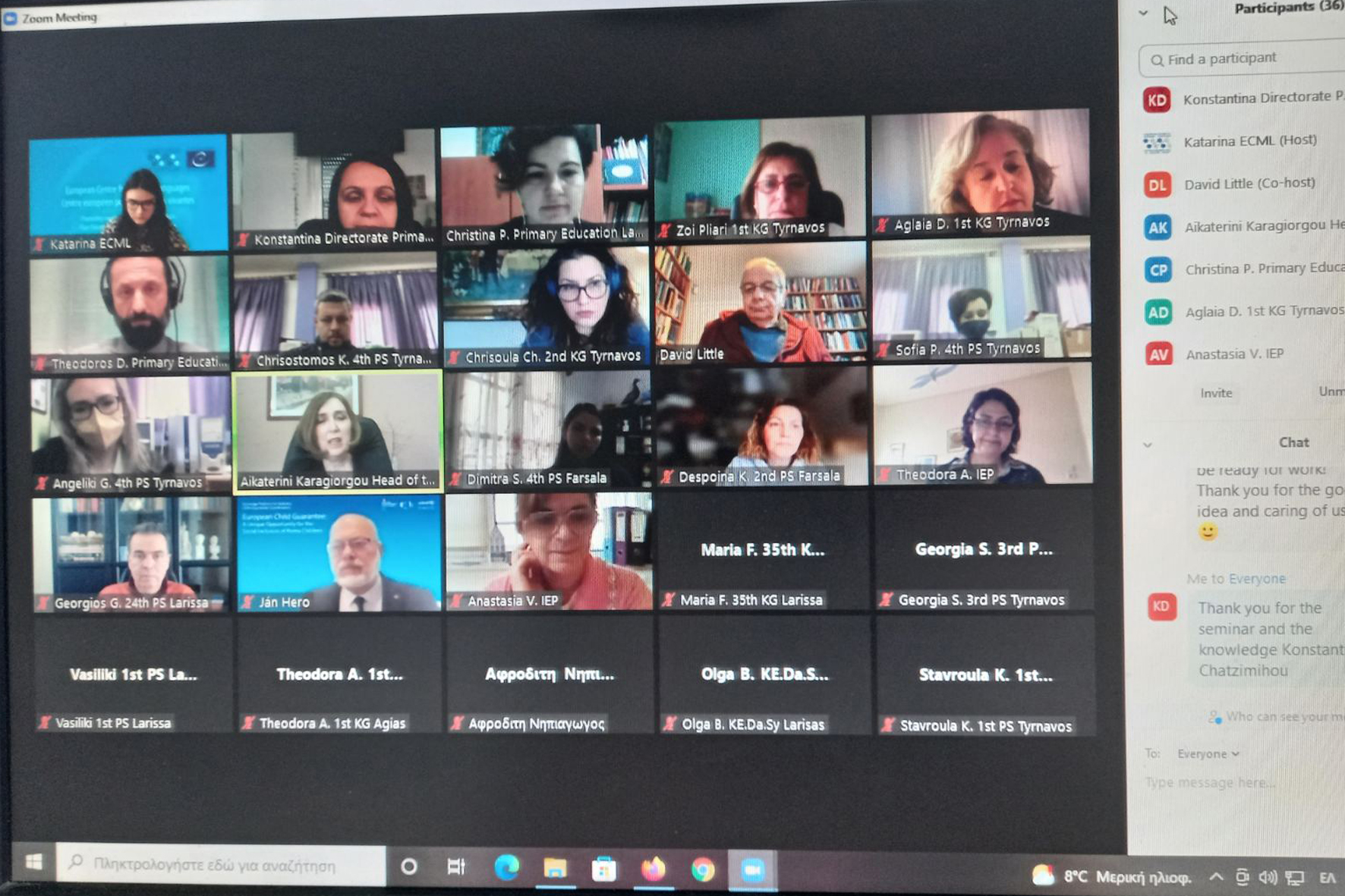
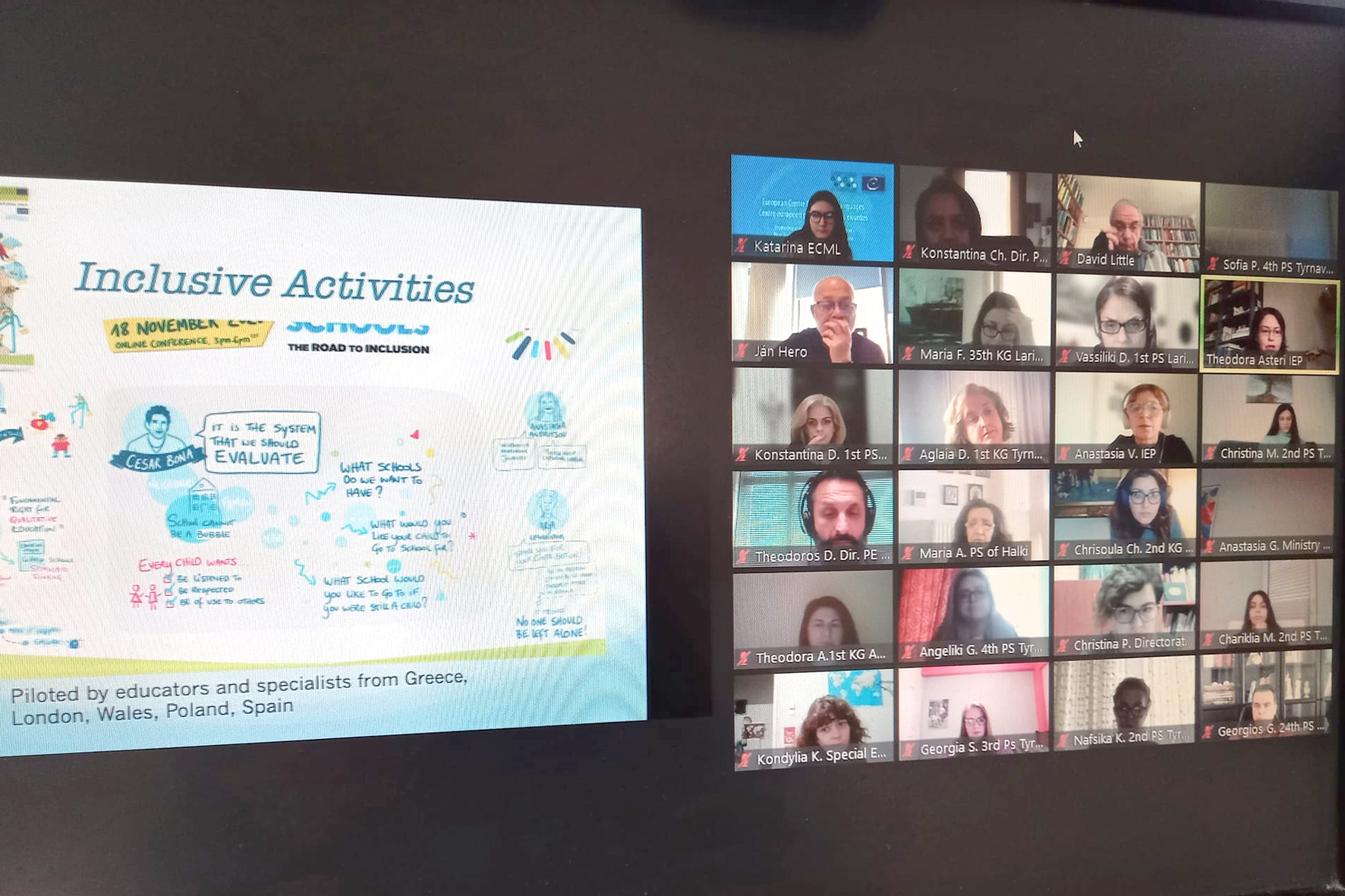
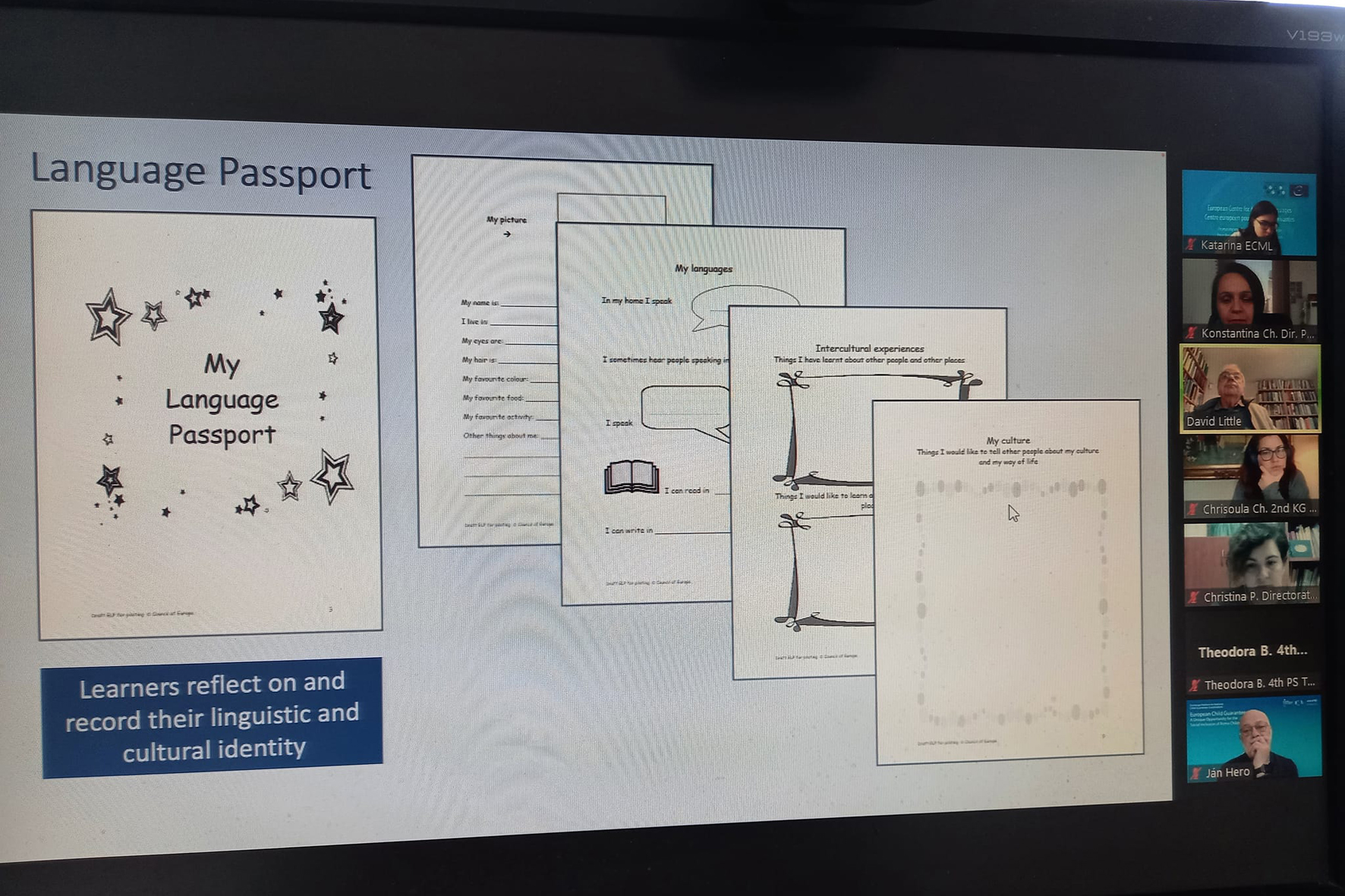
25.11.2021
Quality education in Romani for Europe: QualiRom training in Croatia
Local organisation of the ECML training and consultancy event: Snježana Šincek and Ana Kešina, Ministry of Science and Education of the Republic of Croatia.
ECML experts: David Little (Ireland), Ján Hero (Slovak Republic).
Participants: 15 teachers in primary and secondary schools, and representatives of NGOs involved with the integration of Roma children.
The Quality Education in Romani (QualiRom) workshop was held online in Croatia on 8 November 2021, in cooperation with the European Centre for Modern Languages (ECML) of the Council of Europe and the Ministry of Science and Education of the Republic of Croatia. The workshop was moderated by a team of ECML experts - David Little from Ireland and Ján Hero from the Slovak Republic.
During the event, participants were introduced to methods and practical procedures that will help them identify students' language needs in their subject. The workshop was organised with the aim of promoting the inclusion of Roma in the education system and facilitating the integration of Romani speakers and improving the educational situation of Romani children.
The workshop presented the Council of Europe's Curriculum Framework for Romani (CFR), part of the Council of Europe's comprehensive response to issues related to the education of members of the Roma national minority.
Challenges and experiences in the work and integration of Roma children into teaching were discussed, in order to facilitate and encourage the inclusion of Roma children and group work in the classroom by applying the Framework Curriculum and adapting it to the specifics of the local community.
The participants were introduced to the basics of the plurilingual and intercultural approach of the Council of Europe to education and additionally also became aware of the challenges it poses to schools and teachers in Croatia.
Snježana Šincek and Ana Kešina
Croatian version
QualiRom radionica u Hrvatskoj
Quality Education in Romani – QualiRom radionica je u Hrvatskoj održana online 8. studenoga 2021. godine, u suradnji Europskog centra za moderne jezike i Ministarstva znanosti i obrazovanja Republike Hrvatske. Radionicu je moderirao tim stručnjaka ECML-a – gospodin David Little iz Irske i gospodin Ján Hero iz Slovačke.
Tijekom radionice sudionici su upoznati s metodama i praktičnim postupcima koji će im pomoći u prepoznavanju jezičnih potreba učenika u svom predmetu. Radionica je organizirana s ciljem promicanja uključivanja Roma u obrazovni sustav i olakšavanja integracije govornika romskog jezika te poboljšanja obrazovne situacije romske djece.
U okviru radionice predstavljen je Okvirni kurikulum za romski jezik (CFR) Vijeća Europe, nastao kao dio projekta QualiRom - opsežnog odgovora Vijeća Europe na pitanja vezana uz obrazovanje pripadnika Romske nacionalne manjine.
Razmotreni su izazovi i iskustva u radu i integraciji romske djece u nastavu, kako bi se primjenom Okvirnog kurikuluma i njegovom prilagodbom specifičnostima lokalne zajednice olakšalo i potaknulo inkluziju romske djece i zajednički rad u učionici.
Sudionici radionice upoznati su s osnovama višejezičnog i interkulturalnog pristupa Vijeća Europe obrazovanju te su dodatno osvijestili izazove koje ono postavlja pred škole i učitelje u Hrvatskoj.
Snježana Šincek and Ana Kešina
20.10.2020
QualiRom online workshop (9 October 2020, Alexandroupolis, Greece)
Local organisation: Ioannis Galantomos, Assistant Professor, Department of Primary Education, Democritus University of Thrace (DUTH), Greece.
ECML experts: David Little (Trinity College Dublin, Ireland) and Barbara Schrammel-Leber (University College of Teacher Education, Graz, Austria).
Participants: 33 primary and secondary education teachers (kindergarten & primary school teachers, secondary education Greek/English/French language teachers) & regional education coordinators of the above specialties.
On 09.10.2020 the “Quality education in Romani for Europe/QualiRom” workshop took place as a hybrid event, with trainers online and participants based in Thrace, Greece. The workshop was organised by the ECML and the Department of Primary Education of the Democritus University of Thrace. Thirty-three primary and secondary education schoolteachers and regional education coordinators from various regions of Greece participated in the event. The trainers were the coordinator of the ECML expert team, Prof. David Little (Trinity College Dublin, Ireland) and Professor Barbara Schrammel-Leber (University College of Teacher Education, Graz, Austria).
Prof. Little presented the principles guiding the ECML approach to plurilingual education in a clear manner and familiarised the participants with a case-study from Ireland and its potential applications to Roma students’ education. Prof Schrammel-Leber then provided detailed information on the origins and structure of Romani. The presentations of both trainers gave participants the opportunity for interaction (given the conditions of online training), allowing them to exchange views and good practices. Overall, the QualiRom workshop emphasised the need for more training events on language teaching to students of diverse language and cultural background in Thrace, Greece.
*****
Greek version
Στις 09.10.2020 πραγματοποιήθηκε, για πρώτη φορά στη Θράκη, Ελλάδα, διαδικτυακή επιμορφωτική δράση για την εκπαίδευση των μαθητών Ρομά με τίτλο «Quality education in Romani for Europe/QualiRom». Η εν λόγω επιμορφωτική δράση διοργανώθηκε από το ECML και το Παιδαγωγικό Τμήμα Δημοτικής Εκπαίδευσης του Δημοκριτείου Πανεπιστημίου Θράκης με τη συμμετοχή 33 εκπαιδευτικών/Συντονιστών Εκπαιδευτικού Έργου της Πρωτοβάθμιας & Δευτεροβάθμιας Εκπαίδευσης από διάφορες περιοχές της Ελλάδας. Οι επιμορφωτές ήταν ο επικεφαλής της Ομάδας ειδικών του QualiRom, Καθηγητής David Little (Trinity College Dublin, Ireland) και η Καθηγήτρια Barbara Schrammel-Leber (University College of Teacher Education, Styria, Austria).
Ο Καθηγητής Little με απλό και σαφή τρόπο παρουσίασε τις αρχές που διέπουν την προσέγγιση του ECML σχετικά με την πολύγλωσση εκπαίδευση, ενώ μέσω της ανάλυσης μιας περίπτωσης-μελέτης από την Ιρλανδία εξοικείωσε τους επιμορφούμενους αφενός με το πλαίσιο εκπαίδευσης αλλόγλωσσων μαθητών και αφετέρου με τις δυνητικές πρακτικές εφαρμογές στην εκπαίδευση των μαθητών Ρομά. Από το άλλο μέρος, η Καθηγήτρια Schrammel-Leber παρείχε λεπτομερείς πληροφορίες για την προέλευση, την ιστορική διαδρομή και τα βασικότερα γλωσσικά χαρακτηριστικά της Ρομανί. Οι παρουσιάσεις και των δύο επιμορφωτών συνοδεύτηκαν από ευκαιρίες για αλληλεπίδραση (λαμβάνοντας υπόψη τις συνθήκες της εξ’ αποστάσεως επιμόρφωσης) και ανταλλαγή εμπειριών και καλών πρακτικών γεγονός που τόνισε την ανάγκη για περαιτέρω εμβάθυνση σε θέματα γλωσσικής διδασκαλίας σε πληθυσμιακές ομάδες με διαφορετικό γλωσσικό και πολιτιστικό υπόβαθρο στην περιοχή της Θράκης.
Author: Ioannis Galantomos, local organiser
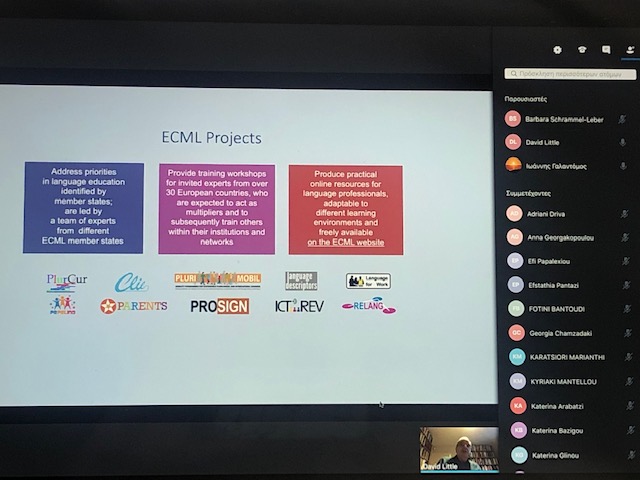
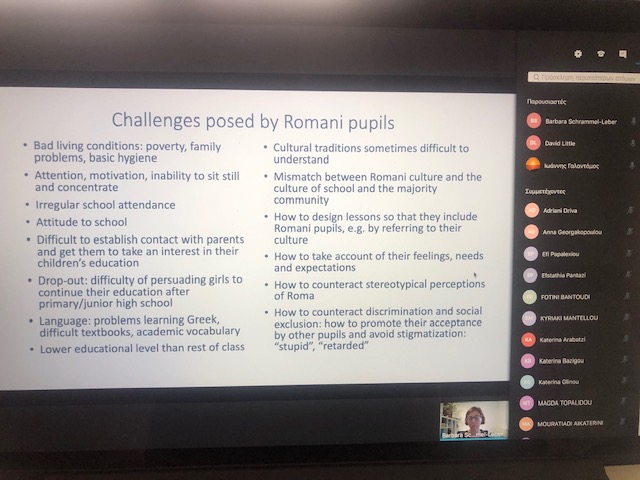
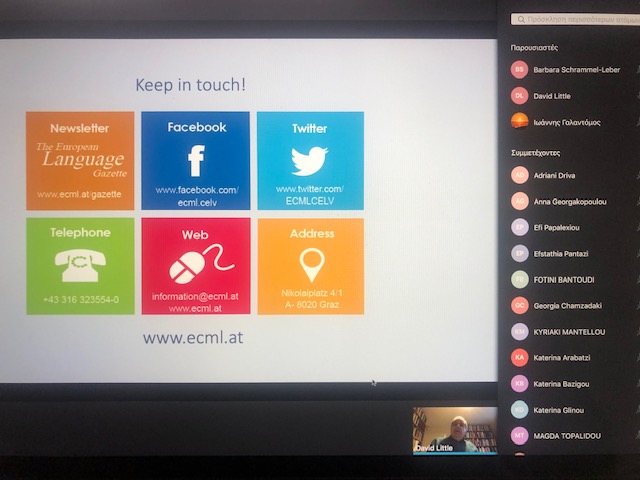
22.03.2019
Romani language teaching in Slovenia: current challenges, ways to improve education quality, learning plan for the Romani language and intercultural learning
Date: 7-8 March 2019
Venue: Ljubljana, Slovenia
Local organisation: Susanne Volčanšek, Zavod Republike Slovenije za šolstvo / The National Education Institute of Slovenia
ECML experts: Ján Hero, David G. Little
Participants: 33 consultants of the National Education Institute in Slovenia, researchers of the Educational Research Institute, preschool teachers, primary school teachers, representatives of the Office for National Minorities, representatives of the Ministry for science, education and sport, teachers of the Centre for School and Outdoor Education, journalists
*****
In partnership with the ECML, the National Education Institute in Slovenia and the Ministry for science, education and sport the QualiRom Training and consultancy event has been conducted in Slovenia for the second time. The seminar gathered participants involved in the education of Roma pupils with rather heterogenous backgrounds: pre-school and primary teachers, school directors, representatives of The National Education Institute in Slovenia, representatives of the Ministry for science, education and sport, researchers of the Educational Research Centre, representatives of non-governmental organisations dealing with Roma education, representatives of the Center for School and Outdoor Education, representatives of the Office for National Minorities and a journalist of the Slovene National television.
After a short introduction of the ECML Professor David Little and Jan Hero familiarized the participants with the Curriculum Framework for Romani (CFR) and both ELP for Romani language.
Participants agreed that the CFR is an important systemic tool for increasing the quality of Romani language teaching in Slovenia. They also agreed that the use of the ELPs will be an important guideline on how to conduct lessons in Romani language and intercultural learning as well. Mr Jan Hero introduced the QualiRom teaching materials and shared the Slovakian experience in education of Roma pupils.
The seminar offered the participants an opportunity to discuss about different challenges and obstacles they confront in the education of Roma pupils. The biggest challenge pointed out is the language barrier: many Roma pupils have a lack of language knowledge in both languages: Romani and Slovene. Entering school means for most Roma pupils that they need to learn two languages: Romani and Slovene. Teachers involved in education of Roma pupils feel overloaded by their own language barrier not knowing Romani. Thus they expressed the need for teaching materials, tools and guidelines for their work.
The National Institute of Education in Slovenia will provide a learning plan for the Romani language and intercultural learning which will also lean on the CFR. Participants agreed that only an efficient knowledge of the first language is crucial for successful learning of additional languages.
Susanne Volčanšek, local organiser
In Slovene language:
V Ljubljani je v organizaciji Zavoda RS za šolstvo in Ministrstva za izobraževanje, znanost in šport ter v sodelovanju z Evropskim centrom za moderne jezike v Gradcu potekal seminar »Ohranjanje in poučevanje romskega jezika v vzgoji in izobraževanju«, ki so se ga udeležili vodstveni in strokovni delavci v vrtcih in osnovnih in srednjih šolah, romski pomočniki, izvajalci v večnamenskih centrih, predstavniki (romskih) nevladnih organizacij, predstavniki ministrstva za izobraževanje, znanost in šport, raziskovalci Pedagoškega inštituta, svetovalci Zavoda RS za šolstvo ter druga zainteresirana javnost (novinarka televizijske oddaje za Rome So vakares, RTV Ljubljana).
Udeležencem seminarja sta predstavila dejavnosti in delovanje ECML David Little in Ján Hero, ki sta povedala, da je glavna značilnost Evropskega centra za moderne jezike organizacija mednarodnih projektov na področju jezikovnega izobraževanja. V nadaljevanju sta udeležencem predstavila dokumente, ki so jih na ECML pripravili za poučevanje in učenje romskega jezika, ki jim bodo lahko v pomoč pri nadaljnjem delu z romskimi učenci.
Udeleženci seminarja so izpostavili različne izzive ali težave, s katerimi se srečujejo tako na področju predšolske vzgoje kot ob vstopu romskih otrok v šolo. V prvi vrsti so izpostavili jezikovno bariero, saj romski otroci ne znajo dovolj dobro ne slovenskega ne romskega jezika. Pogostokrat se ob vstopu v šolo romski otroci začnejo učiti dva jezika, slovenskega in romskega. Prav tako vzgojitelji in učitelji ne znajo romskega jezika, ki ima poleg tega veliko dialektov. Vzgojitelji in učitelji so ob tem izrazili potrebo po pripomočkih, učnih gradivih, ki bi jim bili v pomoč v procesu vzgoje in poučevanja.
Na Zavodu RS za šolstvo pripravljajo »usmerjevalni načrt« kot podporno gradivo učiteljem za poučevanje romskega jezika. Dobro znanje materinščine je namreč pogoj za dobro razumevanje slovenščine.
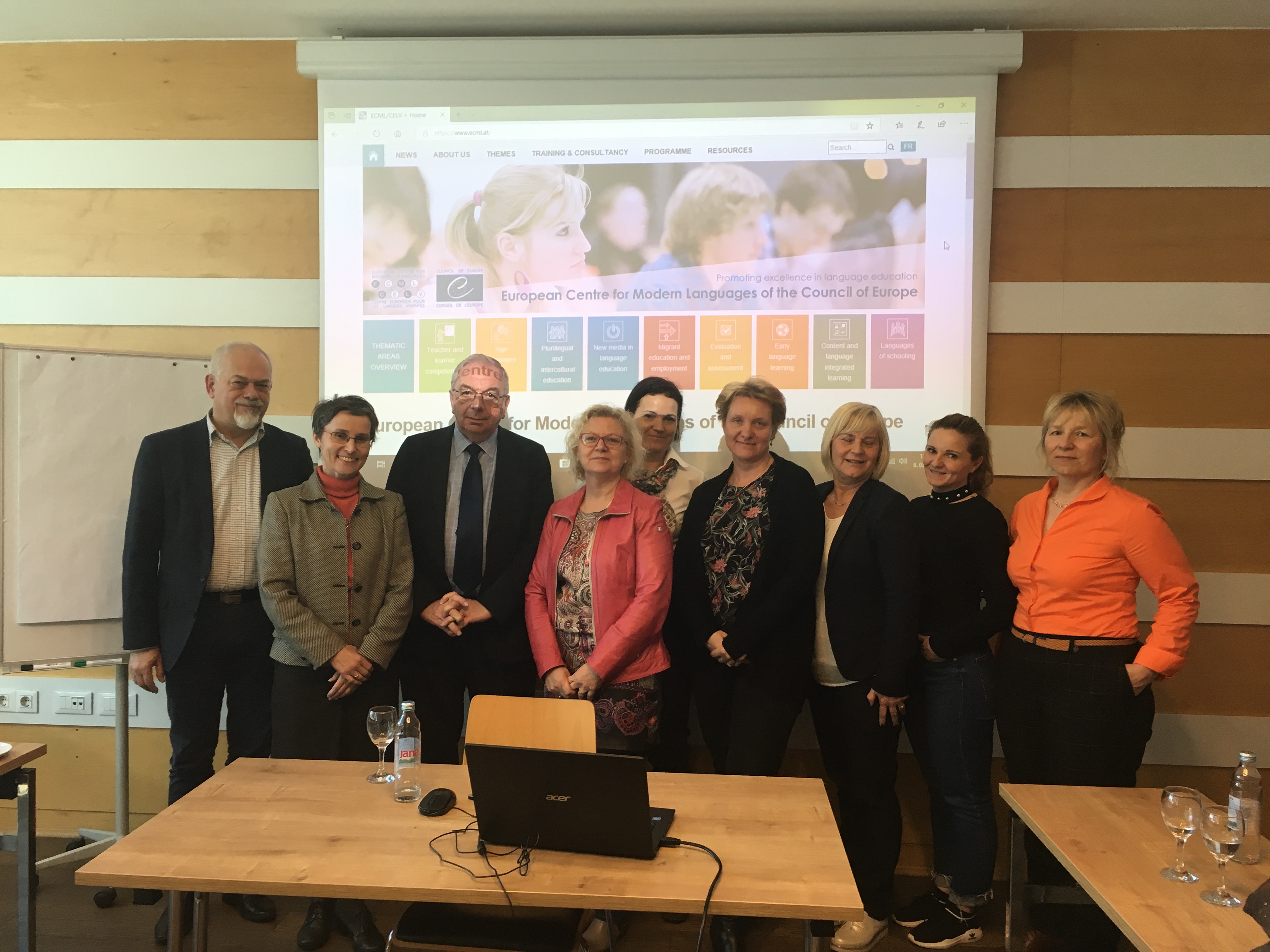
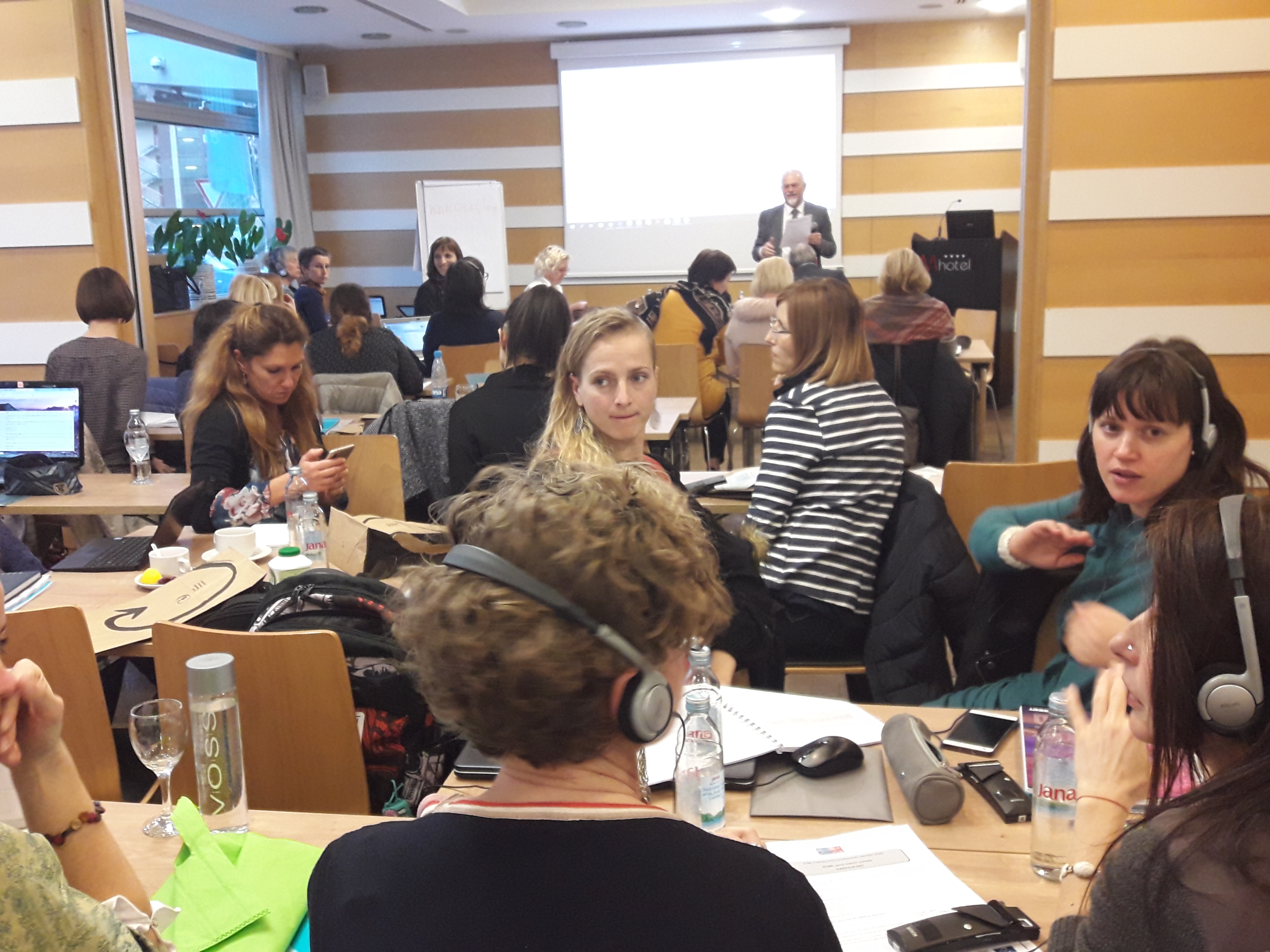
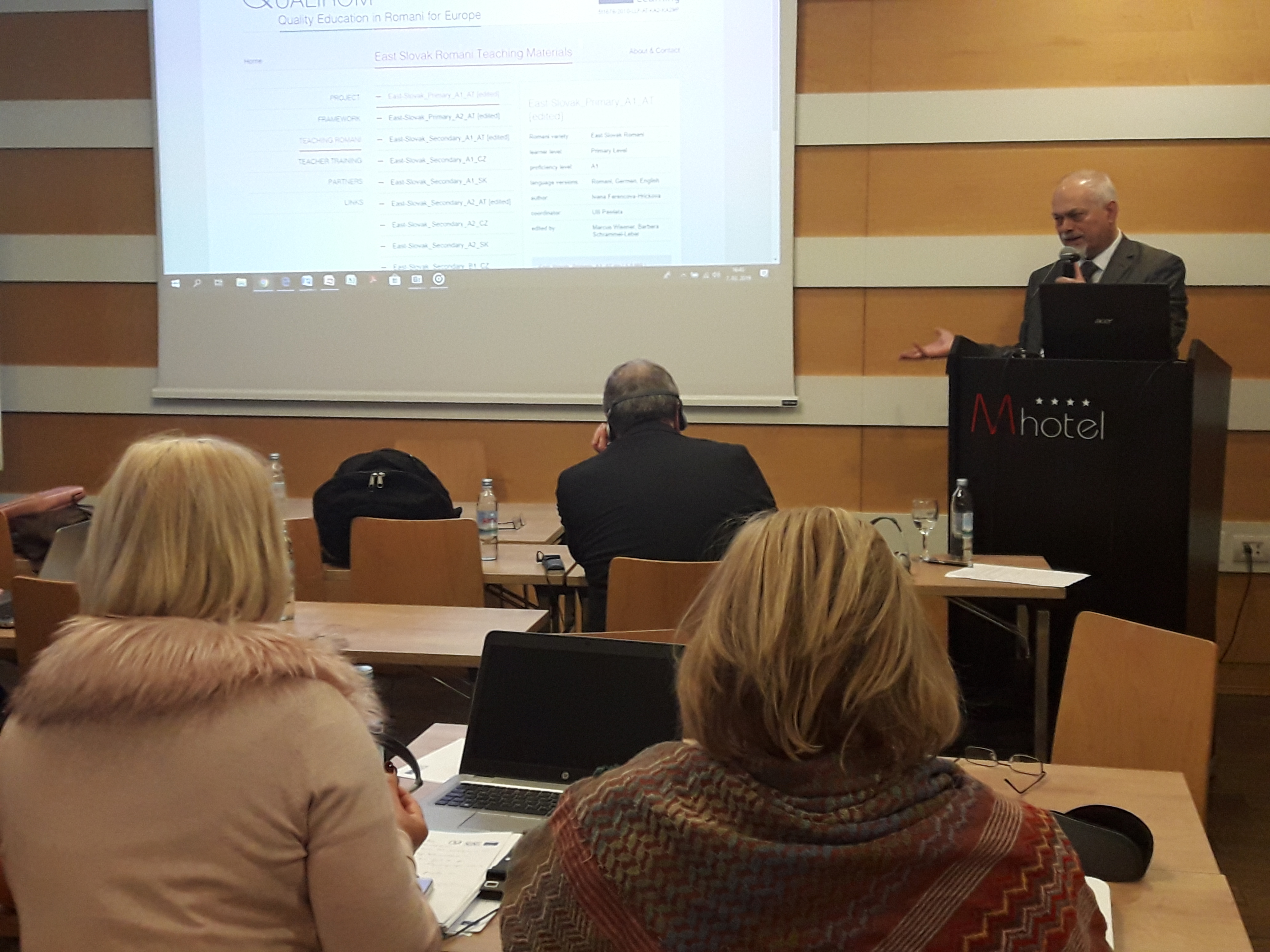
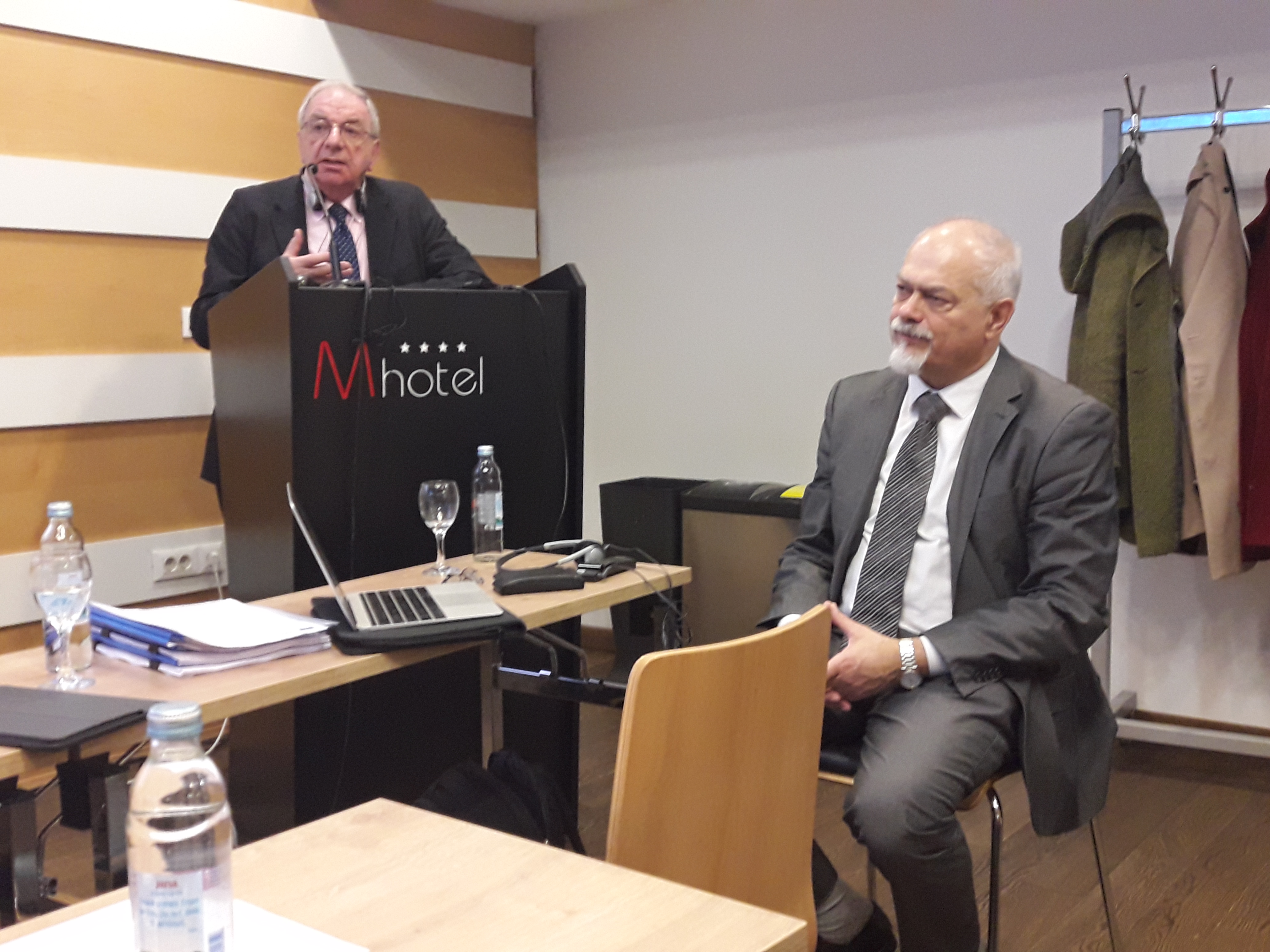
23.09.2018
"Quality education in Romani for Europe" - ECML training and consultancy offers for 2019: apply until 4 November 2018!
To promote quality education in Romani within a human rights perspective by providing training on the use of QualiRom materials and consultancy on the Curriculum Framework for Romani for curriculum development (CFR).
This offer seeks to build upon the foundation already provided by QualiRom (materials, training CFR) to offer member states 2-day consultancies / workshops in accordance with local needs:
- consultancy on the Curriculum Framework for Romani for curriculum development;
- consultancy and training on the Curriculum Framework for Romani and corresponding European Language Portfolios for textbook writing and materials development;
- training on the use of QualiRom materials (and the possible localisation of these materials);
- consultancy and training based on the QualiRom teacher training module.
Target groups
- policy makers, decision takers and curriculum developers
- text writers and materials developers
- teacher trainers and teachers
- institutions and agencies involved in training teachers of Romani and Romani teaching
ECML experts in language education work with national authorities and local experts to devise and implement in-country activities, tailored to the particular context and target audience.
Detailed information on this offer and the 2019 request form are available on the dedicated web page.
Requests for a training and consultancy activity must be submitted via the national ECML representative in the Governing Board. Educational professionals interested in organising a particular activity should therefore contact their national representative.
Deadline for submission of requests by the ECML Governing Board member: 4 November 2018.
*****
If you are looking for input for an in-service training to develop the professional skills of language educators or are in need of consultancy to advance local, regional or national reform processes and to meet international standards, take a closer look at what the ECML has on offer.
Information on offers and the 2019 request form are available online http://www.ecml.at/TrainingandConsultancy
17.09.2018
ECML training and consultancy offers for 2019 – Apply now!
Are you looking for input for an in-service training to develop the professional skills of language educators? Or are you in need of consultancy to advance local, regional or national reform processes and to meet international standards? Then take a closer look at what the ECML has on offer.
ECML experts in language education work with national authorities and local experts to devise and implement in-country activities, tailored to the particular context and target audience.
Information on offers and the 2019 request form are available online: http://www.ecml.at/TrainingandConsultancy
Requests for a training and consultancy activity must be submitted until 4 November 2018 via the national ECML representative in the Governing Board.
Educational professionals interested in organising a particular activity should therefore contact their national representative.
23.05.2018
Quality education in Romani for Europe: QualiRom training for practitioners in Slovakia (Bratislava, 10-11 April 2018)
Slovakia participated in the development of the QualiRom materials (2010–2013), and for several years a small number of Slovak schools have been using the Curriculum Framework for Romani (CFR), the accompanying European Language Portfolios (ELP) and the QualiRom materials. Currently five schools are piloting a framework programme developed by the State Pedagogical Institute on the basis of the CFR, and the teachers are using the ELPs to promote reflective learning on the basis of learner self-assessment.
The QualiRom workshop in April was designed to bring these practitioners together and discuss their experience in the light of Council of Europe principles and a reconsideration of the CFR and ELPs.
(David Little, Helena Sadílková, ECML project QualiRom)
The ECML training and consultancy workshop fulfilled its mission for all participants: language teachers at primary and secondary schools, their directors, textbook authors, representatives of the National Curricular Institution and of two universities that carry out activities in cooperation with the Ministry of Education to offer students programmes aimed at preparing Roma teachers in combination with other school subjects.
Participants agreed that the Curriculum Framework for Romani (CFR) is an important systemic tool for increasing the quality of Romani language teaching in Slovakia and so far compensates the lack of a language institution for the development of the Roma language.
Participants were inspired to create an Association of Romani teachers and by the end of the workshop had formulated the mission of this emerging platform. On the basis of the CFR the State Pedagogical Institute will develop annual plans for teachers teaching Romani language at primary schools and secondary schools for different language levels and pupil age. Participants expressed the need for a follow-up meeting with the ECML experts for consultation during the process of creating the aforementioned pedagogical documents.
(Silvia Galyasová, Ministry of Education, Science, Research and Sports in the Slovak Republic, local organiser of the training workshop)
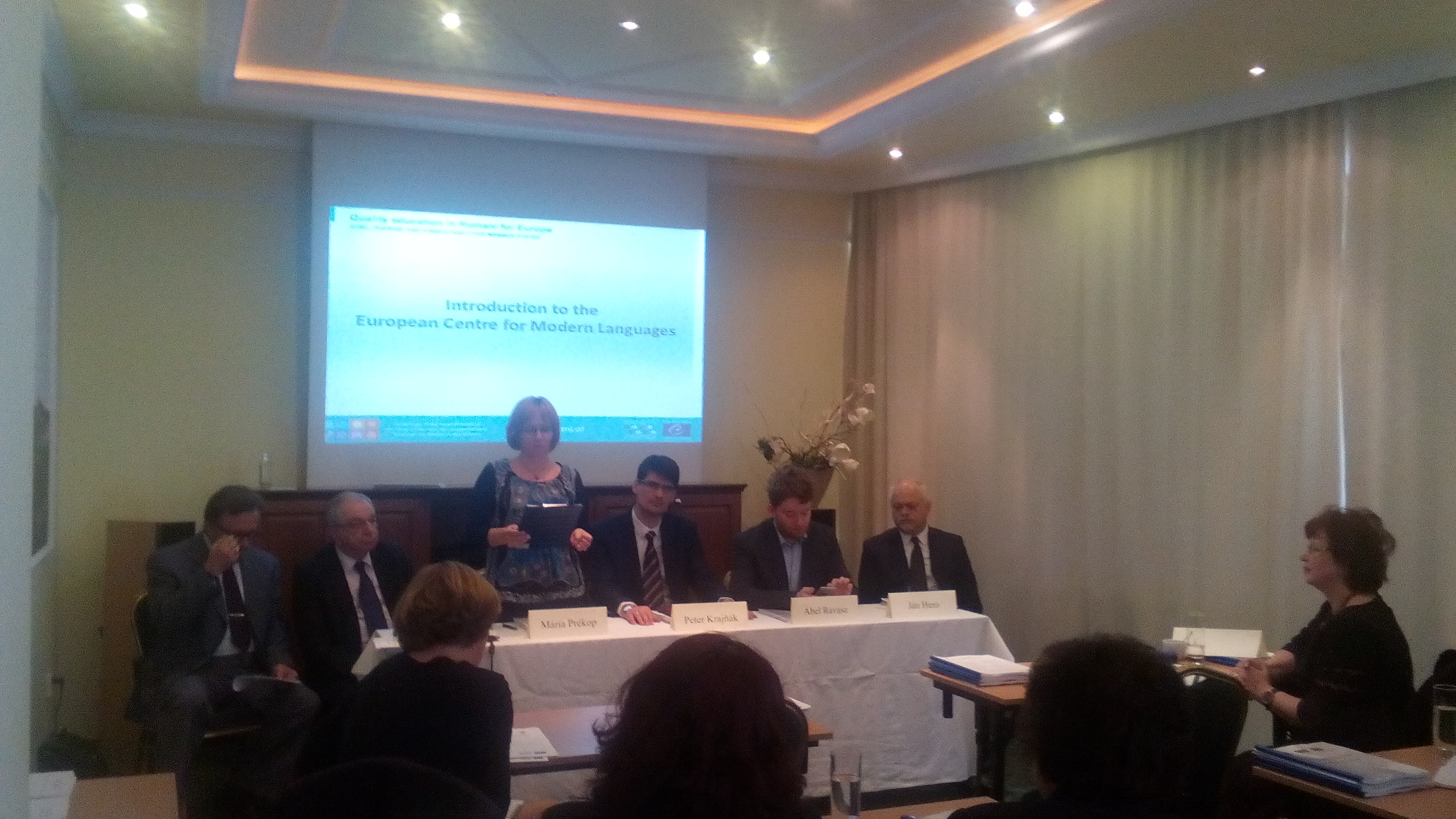
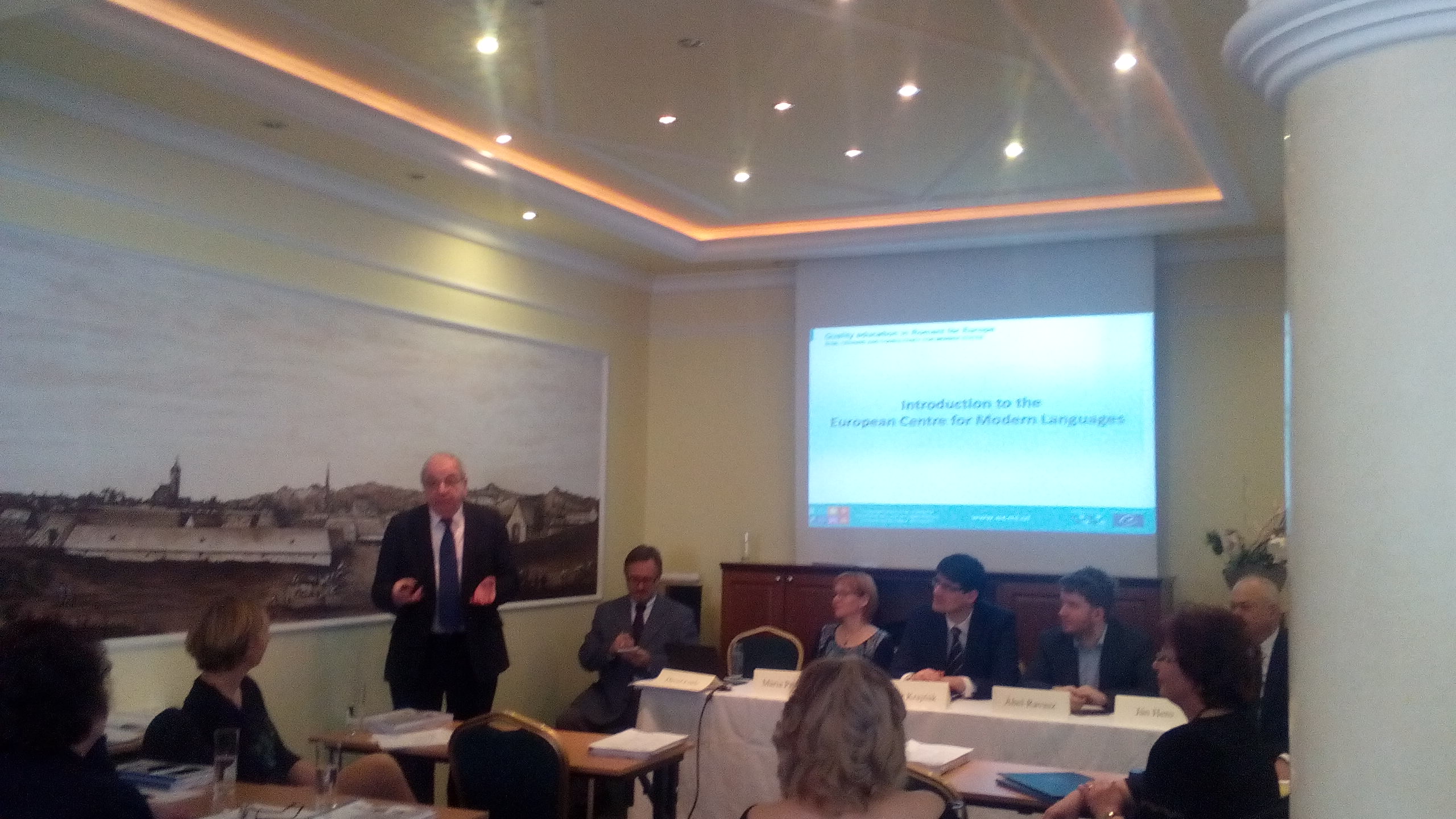
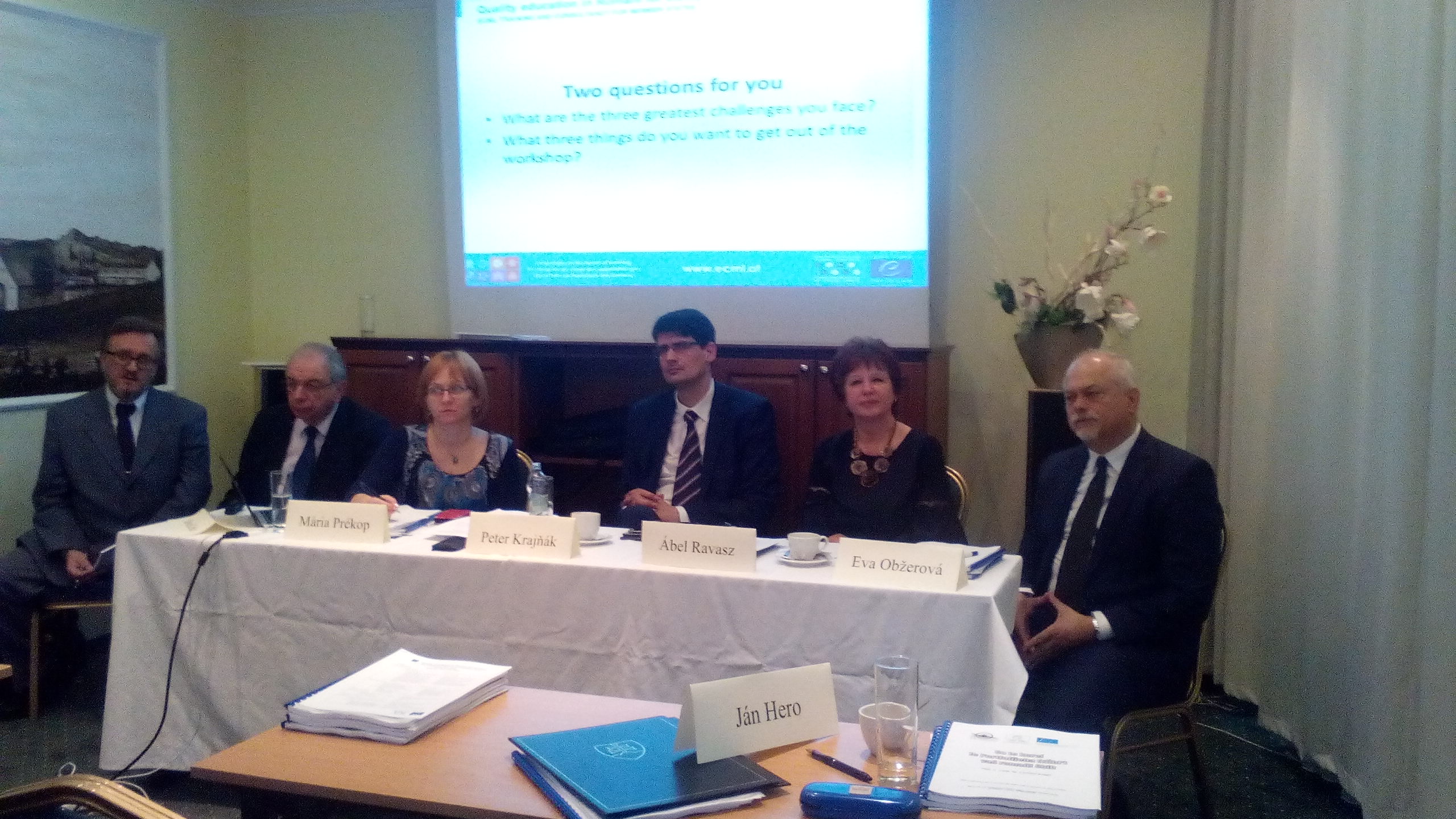
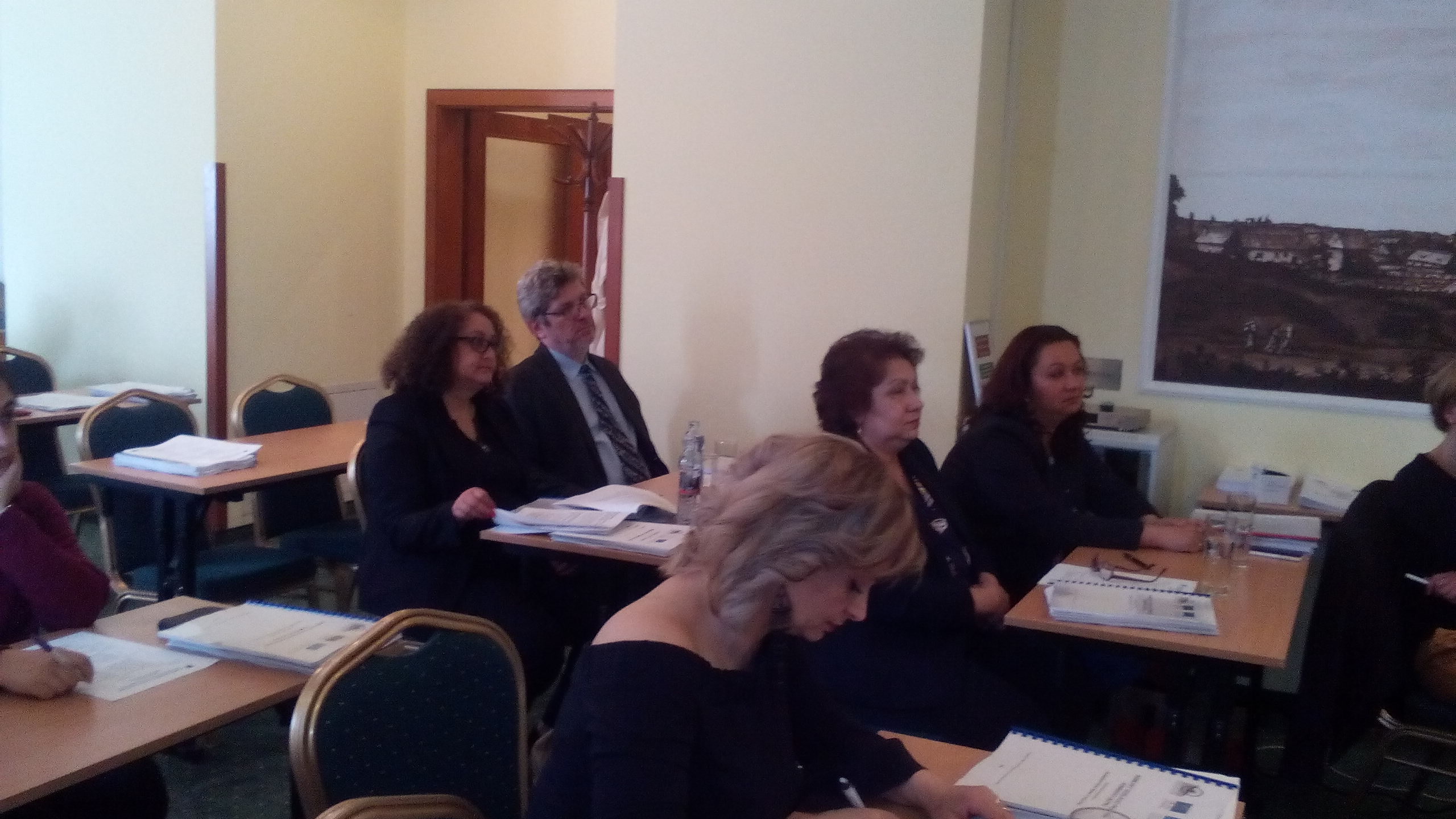
23.12.2017
Report on the Seminar QualiRom held at the University of Belgrade (14-15 September 2017)
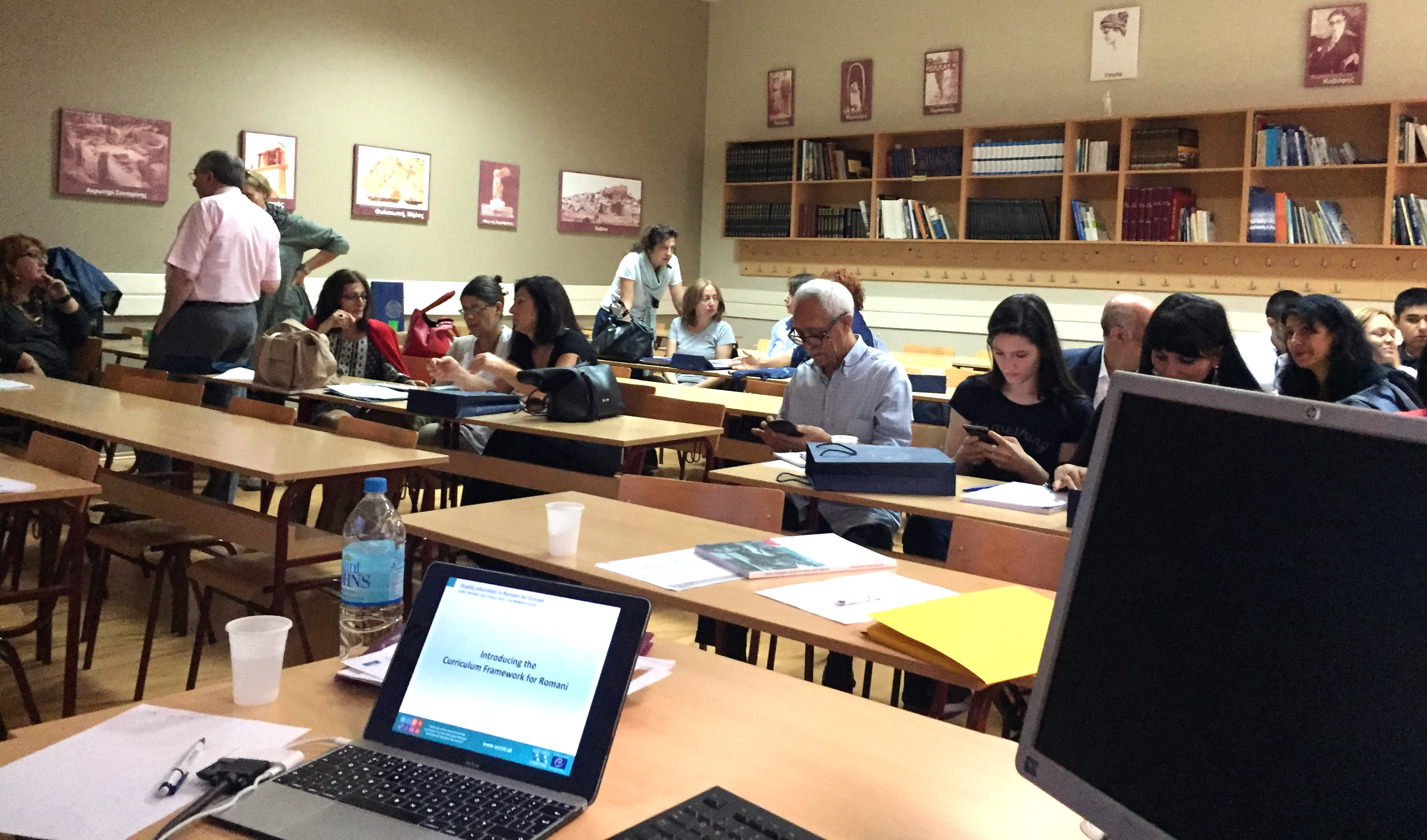
The QualiRom Seminar gathered participants involved in the education of Roma pupils. This rather heterogeneous group gathered:
-
representatives of Мinistries and Institutes dealing with educational policies, developing curricula, evaluation of the quality of textbooks, professional development of teachers and evaluation of the quality of education
-
teachers and assistants working directly in schools with Roma children
-
representatives of non-governmental organizations dealing with Roma education and
-
Roma students and teachers working at universities that educate teaching staff
It was essential to have such a heterogeneous group of participants from all levels so that the document presented by professors David Little and Jan Hero are used in the best possible way at all levels and fields of activity. The lecturers also presented the theoretical side of the document, the purpose and the multiple possibilities of its application, as well as the examples of good practice. Through the workshops, the lecturers tried to make each participant find the points in the document that is relevant to their work domain – from the descriptors that facilitate the development of curricula and testing to the specific teaching examples that can be directly applied in teaching and working with Roma children.
Participants used this opportunity to present strengths and weaknesses of their own teaching practices and they showed satisfaction that they could receive good advice and suggestions for teaching, as well as the possibility to develop better cooperation with everyone involved in Roma education. The participants were also satisfied to receive numerous materials at the seminar, especially the document prepared by the team and translated into the Serbian language and two dialects of the Romani language.
Training and consultancy website
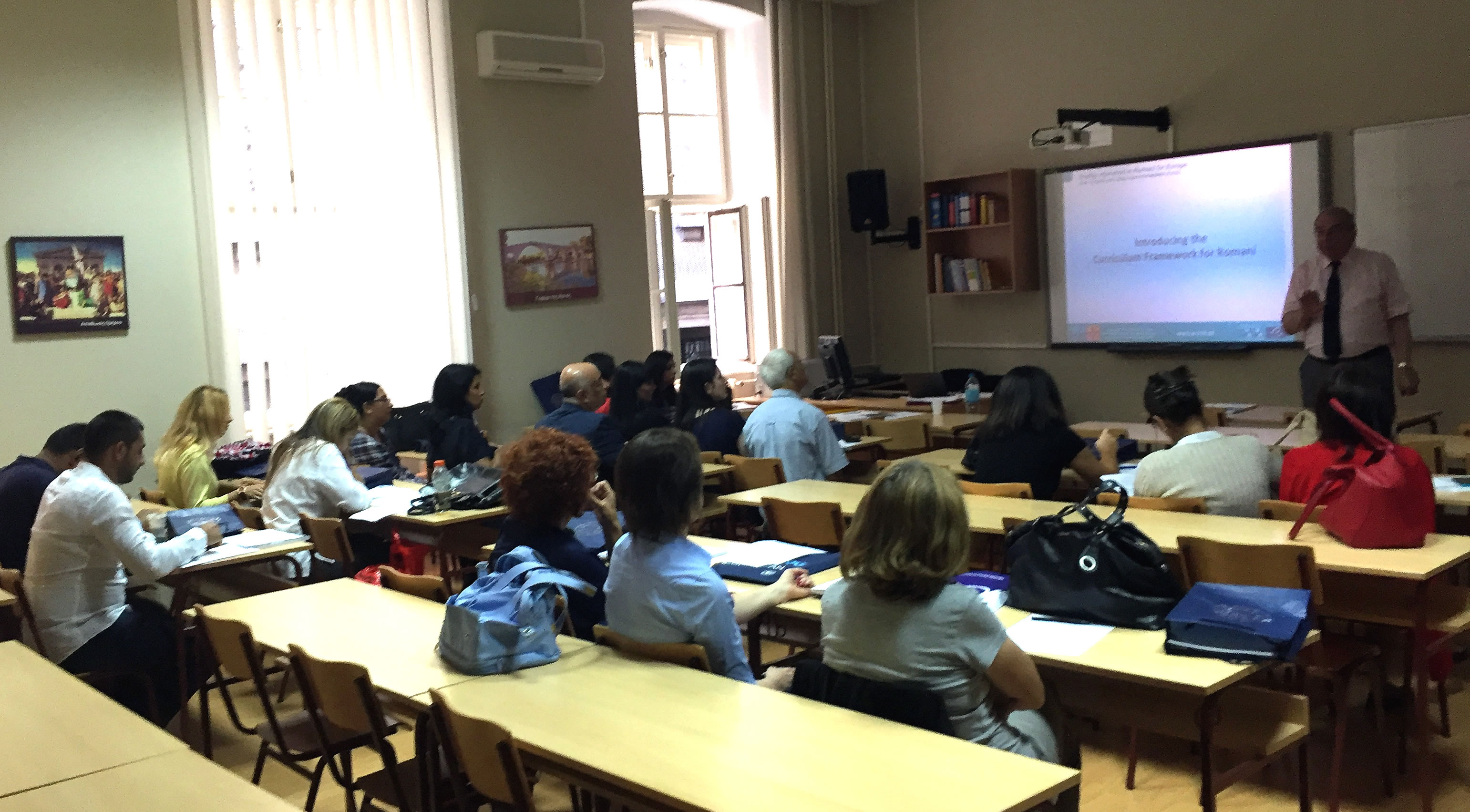
29.03.2017
Ad hoc Committee of Experts on Roma and Traveller Issues (CAHROM) at the ECML
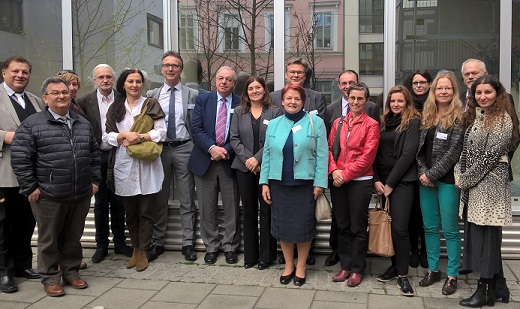
The Ad hoc Committee of Experts on Roma and Traveller Issues (CAHROM) meet at the European Centre for Modern Languages on 29-31 March. The thematic visit, involving representatives from 9 countries, focuses on the protection, preservation and teaching of languages spoken by Roma, Sinti and Yenish, including ways to handle the opposition of traditional communities to have their languages written and taught.
The group will also address the usability of the existing policies and materials for the improvement of the situation of the languages spoken by Roma and Travellers and the future perspectives of their developments.
At the meeting, the ECML's training and consultancy initiative "Quality education in Romani for Europe (QualiROM)" will be presented.
Links
- CAHROM website
- Quality education in Romani for Europe (QualiROM)